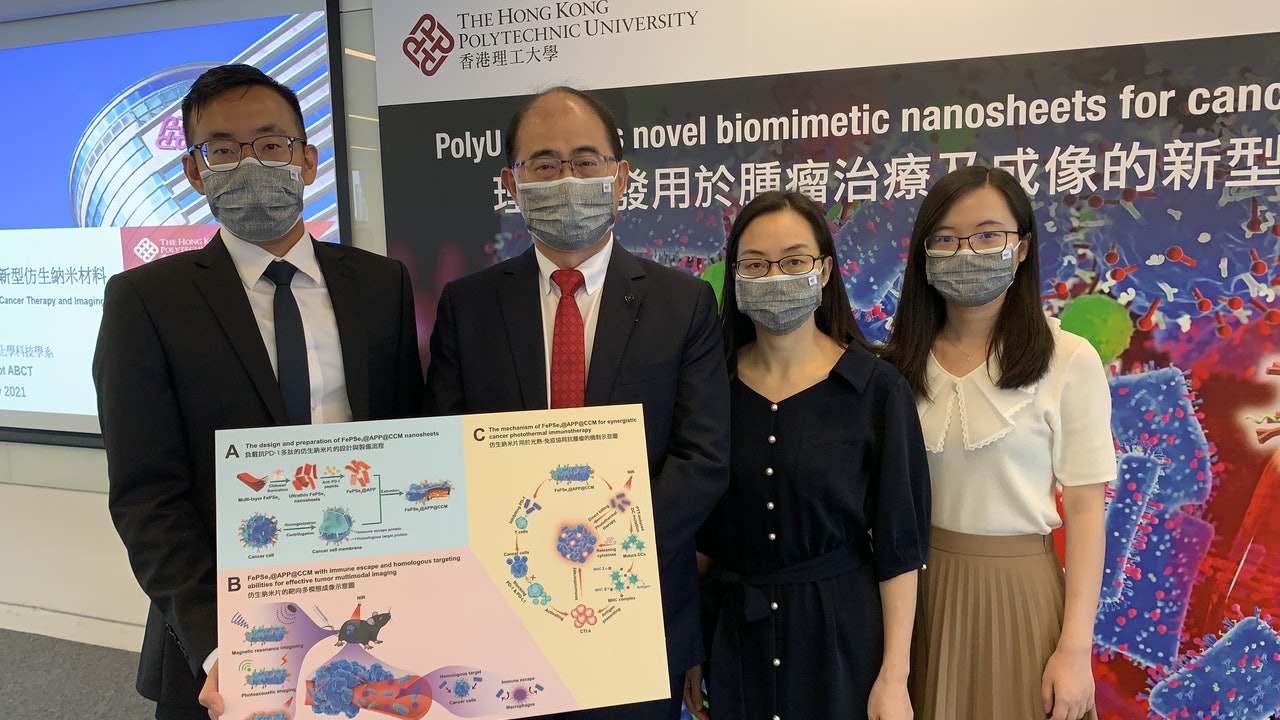Social News
Written by: Chen Jiahui
2021-05-31 14:09
Last update date: 2021-05-31 14:09
Cancer is the number one killer in Hong Kong, but traditional surgery, chemotherapy or radiotherapy have not been able to achieve precise treatment, and they have serious side effects on the human body.
The latest research of the University of Science and Technology uses bionic nanomaterials as a carrier to improve the effect of cancer treatment with the synergistic effect of immunotherapy and photothermal therapy, and can track tumor development and treatment processes in real time.
Lu Weisen introduced that the team used ultra-thin nanomaterials with anti-PD-1 polypeptides (APP) for immunotherapy.
(Photo by Chen Jiahui)
According to Dr. Lu Weisen from the Department of Applied Biology and Chemical Technology, PolyU, the team uses ultra-thin nanomaterials with anti-PD-1 polypeptides (APP) for immunotherapy. APP can prevent tumor cells from inhibiting the activation of the immune system. It can play a normal function, attack cancer cells, and achieve immunotherapy effects; and the nanosheets are also coated with tumor cell membranes grown in the laboratory to form targeted bionic nanomaterials, which can be aggregated only by intravenous injection. Tumor location.
Lu Xu pointed out that the nanomaterial used by the team is iron, phosphorus, selenium, which has the ability to convert light to heat. It generates heat energy under near-infrared laser irradiation to kill cancer cells and further intensify immune cells to achieve the effect of photothermal therapy.
He added that photothermal therapy is an emerging technology that is not currently in clinical use. He hopes that this research can further promote the application of related therapies.
Cancer treatment tends to be integrated with diagnosis and treatment. He said that the three materials of iron, phosphorus and selenium have three imaging functions, including magnetic resonance (MRI), photoacoustic imaging and photothermal imaging, which can help track nanomaterials, monitor tumor development and treatment processes.
Gu Yanjuan said that the nanomaterials studied in this study are suitable for the treatment of superficial cancers, such as colon cancer, breast cancer and cervical cancer. In the future, further studies will be conducted on the safety of nanomaterials used in humans for a long time, and clinical trials are expected to begin in five years. .
(Photo by Chen Jiahui)
In terms of treatment effect research, Dr. Gu Yanjuan, Scientific Director of the Department of Applied Biology and Chemical Technology, PolyU pointed out that the team had conducted experiments on a group of mice with subcutaneous colon cancer and found that after 25 days of treatment, the tumor size was reduced to the original size. One-fifth, the transfer rate of mice was three times higher than that of the control group, and no obvious damage to other organs of mice was found.
Gu Yanjuan said that the nanomaterials studied in this study are suitable for the treatment of superficial cancers, such as colon cancer, breast cancer and cervical cancer. In the future, further studies will be conducted on the safety of nanomaterials used in humans for a long time, and clinical trials are expected to begin in five years. .
She pointed out that the research and development and production costs of nanomaterials are lower than those of existing targeted drugs and other cancer treatment methods. It is expected that the new technology can reduce treatment costs. The research funding this time is about 2 million yuan, which is funded by PolyU and the government.
The PolyU team uses ultra-thin nanomaterials with anti-PD-1 polypeptides (APP) for immunotherapy.
(Photo by Chen Jiahui)
Hong Kong Science and Technology Park and AstraZeneca fund 6 million start-ups to assist in research on tumor treatment solutions
CUHK Professor Mo Shujin's research on lung cancer treatment is honored as ``2020 Oncology Giant''
The hospital promotes the "blood replenishment" of patients before surgery and successfully reduces the blood transfusion rate of colorectal tumor surgery
Hong Kong's first minimally invasive laparoscopic resection of liver tumor in a child, 9-year-old child can return to school two weeks after surgery
01News
Polytechnic University





/cloudfront-eu-central-1.images.arcpublishing.com/prisa/DIVX7BL6E5FR3M6YJQCNYTBK7E.jpg)

/cloudfront-eu-central-1.images.arcpublishing.com/prisa/KMEYMJKESBAZBE4MRBAM4TGHIQ.jpg)



